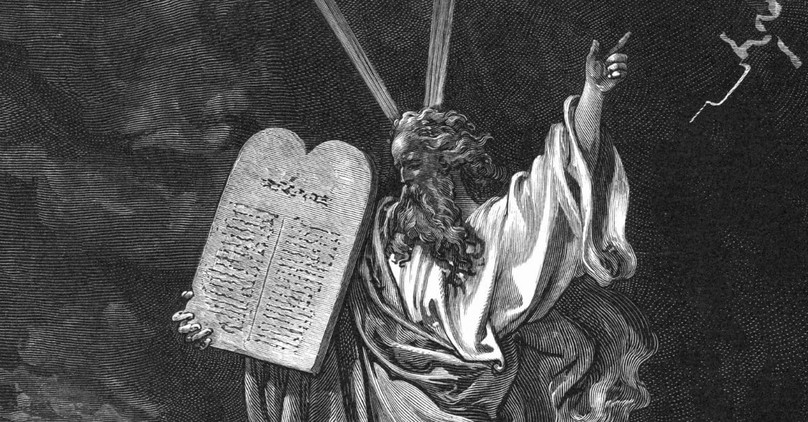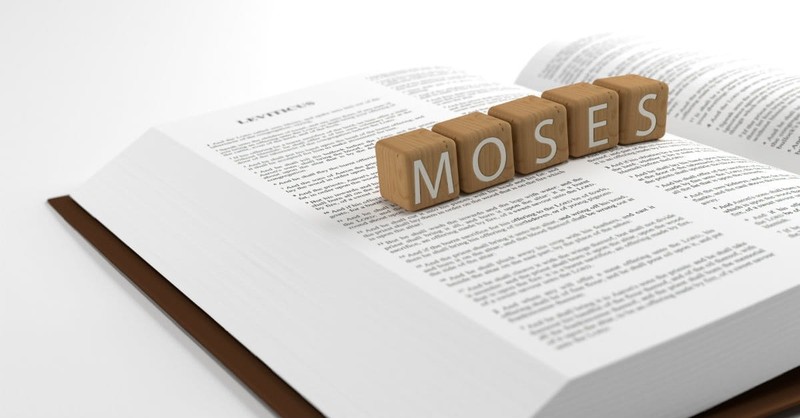
Moses was famous long before Charlton Heston raised his profile in the 1956 Cecile B. DeMille movie, The Ten Commandments.
Universally recognized as the deliverer of his people, the Israelites, from slavery in Egypt, biblical and human history also credit Moses with establishing Israel’s judicial and religious systems. But there’s much more to Israel’s mighty leader than what makes the headlines. In the list below, I’ve collected 20 fascinating but little known details about this great hero of the faith. This collection of facts about Moses is like a grain of sand in the desert of Sinai. It’s no wonder the movie that brought Moses to life for millions, The Ten Commandments, became Cecile B. DeMille’s most successful work.
If this peek into Moses’ life has piqued your interest, you can read all the glorious details in the Old Testament books of Exodus, Numbers, and Deuteronomy.
Here are 10 facts about the life of Moses and his role in the Bible every Christian should know.

1. Moses was the first abandoned child mentioned in the Bible.
Moses’ godly parents hid him for three months to protect him from the Egyptian edict that said all male Hebrew babies must be killed. When they could no longer hide him, they set him afloat in a basket on the Nile River (Ex. 2:3).
"Now a man from the house of Levi went and took as his wife a Levite woman. The woman conceived and bore a son, and when she saw that he was a fine child, she hid him three months. When she could hide him no longer, she took for him a basket made of bulrushes and daubed it with bitumen and pitch. She put the child in it and placed it among the reeds by the river bank. And his sister stood at a distance to know what would be done to him."
.1200w.tn.jpg)
2. His name means son or deliverer.
Moses’ name, according to the website, Behind the Name, “comes from the Hebrew name מֹשֶׁה (Mosheh) and is most likely derived from Egyptian mes meaning ‘son,’ but could also possibly mean ‘deliver’ in Hebrew.” ESV footnotes also note that, "Moses sounds like the Hebrew for draw out."
"Therefore, come now, and I will send you to Pharaoh, so that you may bring My people, the sons of Israel, out of Egypt." - Exodus 3:10

3. Moses worked as shepherd while “on the lam.”
On the lam means, 'on the run.' More than just a play on words, when Moses ran from the murder charge (after killing an Egyptian man), he fled to the desert of Midian where he met Zipporah, the daughter of a shepherd. He then began working with her father, Jethro. He married Zipporah and had two sons.
"Now the priest of Midian had seven daughters, and they came and drew water and filled the troughs to water their father's flock. The shepherds came and drove them away, but Moses stood up and saved them, and watered their flock.18 When they came home to their father Reuel, he said, “How is it that you have come home so soon today?” They said, “An Egyptian delivered us out of the hand of the shepherds and even drew water for us and watered the flock.” He said to his daughters, “Then where is he? Why have you left the man? Call him, that he may eat bread.” And Moses was content to dwell with the man, and he gave Moses his daughter Zipporah. She gave birth to a son, and he called his name Gershom, for he said, “I have been a sojourner in a foreign land.”

4. Moses was a man full of excuses.
During the burning bush episode, Moses gave God five lame excuses for why he couldn’t be Israel’s deliverer (Ex. 3-4). Not surprisingly, God rebutted every one.
Excuse 1: I'm a nobody.
“Who am I that I should go to Pharaoh, and that I should bring the children of Israel out of Egypt?” -Exodus 3:11
Excuse 2: I won't know what to say.
“Then Moses said to God, “Indeed, when I come to the children of Israel and say to them, ‘The God of your fathers has sent me to you,’ and they say to me, ‘What is His name?’ what shall I say to them?” - Exodus 3:13
Excuse 3: I won't be believed.
“Then Moses answered and said, “But suppose they will not believe me or listen to my voice; suppose they say, ‘The LORD has not appeared to you.’ ” - Exodus 4:1
Excuse 4: I’m no good at speaking.
“Then Moses said to the LORD, “O my Lord, I am not eloquent, neither before nor since You have spoken to Your servant; but I am slow of speech and slow of tongue.” - Exodus 4:10
Excuse 5: I’m not qualified.
“But he said, “O my Lord, please send by the hand of whomever else You may send.” - Exodus 4:13
.1200w.tn.jpg)
5. Moses probably stuttered.
The New Living Translation of the Bible records Moses’s response to God’s call in Exodus 4:10: "O Lord, I'm not very good with words. I never have been, and I'm not now, even though you have spoken to me. I get tongue-tied, and my words get tangled."
God wasn't concerned with Moses' inability to speak eloquently. God knew that when the time came for Moses to speak on his behalf, he would be equipped by God to deliver the message clearly.

6. Not your typical octogenarian, Moses was 80 years old when he led the children of Israel out of Egypt.
Today, most people his age would be firmly ensconced in their rocking chairs, but not Moses. His first 40 years in Pharaoh’s court had prepared him to lead, and his second 40 years had given him knowledge of the desert through which he and the Israelites would travel. Moses was fully prepared for God’s mission at the age of 80; the best was yet to come.
No matter our age, no matter what we've done or been through in our lives, we know that when God desires to use us for his purposes, nothing can stop him. Age is truly just a number to God.

7. Moses was a songwriter.
Or, more accurately, he was a musical collaborator. After the children of Israel crossed the Red Sea on dry land, the waters closed up, drowning the mighty Egyptian army. To celebrate their deliverance, God composed a song and instructed Moses to write it down and teach it to the congregation. It became known as “The Song of Moses” (Deut. 32:1-43). Here is the beginning of that beautiful song:
“Give ear, O heavens, and I will speak,
and let the earth hear the words of my mouth.
May my teaching drop as the rain,
my speech distill as the dew,
like gentle rain upon the tender grass,
and like showers upon the herb.
For I will proclaim the name of the Lord;
ascribe greatness to our God!
“The Rock, his work is perfect,
for all his ways are justice.
A God of faithfulness and without iniquity,
just and upright is he.

8. Moses didn't write the Ten Commandments, God did.
We often talk about the "Law of Moses", but of course it was always God's law for His people. “The LORD said to Moses, ‘Come up to me on the mountain and stay here, and I will give you the tablets of stone, with the law and commands I have written for their instruction’” (Ex. 24:12). Moses did, however, transcribe the law as given to him by God. These writings compose part of the Pentateuch, the first five books of the Old Testament. (Ex. 24:4).

9. Moses knew in advance the day of his death (Deut. 31:14).
Several times in Deut. 31 we read of Moses either knowing he would die soon, or being told by God he would die soon. But there seems to be no indication of fear from Moses that his time on earth was nearly up. Instead, he used that time to warn the Israelites against disobedience, and he commissioned Joshua as his replacement. After he knew God's work for him on earth had been accomplished, then climb Mt. Nebo. There God showed him the Promised Land, and there he died.

10. God buried Moses on the mountain, and his grave was never found.
All we know is that somewhere in Moab, in the valley of Peor, lie the bones of one of the greatest heroes of the faith. (Deu. 34:5-6).
Since that time no prophet has risen in Israel like Moses, whom the LORD knew face to face. - Deut. 34:10
The author of Hebrews tells us that Moses was a prefigure of Christ:
"Therefore, holy brothers, you who share in a heavenly calling, consider Jesus, the apostle and high priest of our confession, who was faithful to him who appointed him, just as Moses also was faithful in all God's house. For Jesus has been counted worthy of more glory than Moses—as much more glory as the builder of a house has more honor than the house itself. (For every house is built by someone, but the builder of all things is God.) Now Moses was faithful in all God's house as a servant, to testify to the things that were to be spoken later, but Christ is faithful over God's house as a son. And we are his house, if indeed we hold fast our confidence and our boasting in our hope." Hebrews 3:1-6
Lori Hatcher is a blogger, inspirational speaker, and author of the Christian Small Publisher’s 2016 Book of the Year, Hungry for God … Starving for Time, Five-Minute Devotions for Busy Women. A Toastmasters International contest-winning speaker, Lori’s goal is to help busy women connect with God in the craziness of everyday life. She especially loves small children, soft animals, and chocolate. You’ll find her pondering the marvelous and the mundane on her blog, Hungry for God. . . Starving for Time. Connect with her on Facebook, Twitter (@lorihatcher2) or Pinterest (Hungry for God).
Originally published Friday, 10 March 2017.









